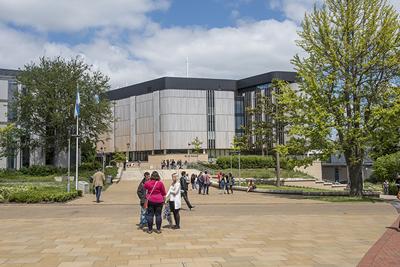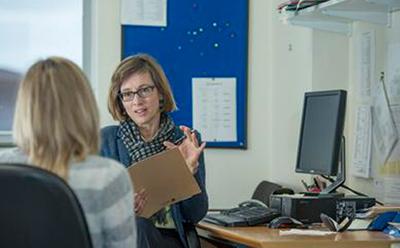We bring researchers, scientists and clinicians together from many different disciplines to establish exciting new connections that result in high impact research.

Our collaborations
Our researchers and scientists are working with their peers from across the University and from other institutions in UK and worldwide, on pioneering projects that are having a direct influence on patient treatment, medical research and government policy.
University Hospital Southampton
The University of Southampton has a strong and long-standing collaboration with University Hospital Southampton (UHS), which has an ambitious five-year strategy to strengthen links with industry and increase commercial research in line with NIHR and Government policy.
The partnership with UHS enables excellent clinical research through quality assured support, facilities and resources embedded at the heart of Southampton General Hospital. We are ideally placed to engage in research drawing on a regional population of over three million, for whom UHS provides tertiary services across all specialties.
Together UHS and the Faculty host a range of key departments that support clinical research including the NIHR Southampton Biomedical Research Centre, the NIHR Southampton Clinical Research Facility and the NIHR Wessex Applied Research Centre.
To support the career development of researchers, UHS and the Faculty, together with the School of Health Sciences, have established the Southampton Academy of Research (SoAR), a centralised pan-professional training hub to support health-related researcher career development across the Southampton partnership.

Institute for Life Sciences
Aligning with the University’s strategy, the Faculty of Medicine has a commitment to interdisciplinary research. The major research themes within the Faculty cross School boundaries and include a wide range of research collaborations between clinical medicine and disciplines in life, physical and social sciences.
This interdisciplinary collaboration is supported by the University’s Institute for Life Sciences (IfLS), whose mission is to facilitate fusions of expertise in research and education from a range of disciplines in order to address key research questions in the life sciences.
Our researchers are working with IFLS on a number of projects including:
- The development of a “Lung on a Chip” for predictive models of the airway epithelial barrier.
- The development of methodologies for routine X-ray µCT for non-destructive 3D histology in partnership with Nikon.
- The FortisNet collaboration, which has brought together one of the largest interdisciplinary groups of clinical, academic and industrial partners nationwide addressing musculoskeletal health from molecule to population.
Computational Modelling Group
With more than 1,000 members, the University-wide Computational Modelling Group brings together researchers using applied computational modelling to support the understanding and advancement of physical and natural sciences, engineering, medicine, economy, society and psychology.
Our researchers are involved in projects enabling the development of mathematical models of biological process such as antigen prestation placental amino acid transport and applications of machine learning to estimating gene pathogenicity in next-generation sequencing data and understanding of stem cell pluripotency.

Centre for Health Ethics and Law
Our researchers contribute to the Centre for Health Ethics and Law within the Southampton Law School, on projects evaluating the fine line between healthcare, law, ethics and policy.
There are a range of issues surrounding life, death, disease and well-being and our scientists work alongside legal experts to promote engagement between academics, health professionals and policy makers, as well as makes substantive contributions to theory and practice.
For example, Professor Anneke Lucassen is researching the role of consent and genetic data, while Professor Nuala McGrath is developing an intervention based on couples counselling for HIV prevention in Sub-Saharan Africa.
Centre for Excellence for Musculoskeletal Health and Work
The University of Southampton is the host institution for the Centre of Excellence for Musculoskeletal Health and Work, a multidisciplinary research collaboration aiming to identify cost-effective ways to minimise the substantial adverse impacts of musculoskeletal disorders in the workplace.
EpiGen international research consortium
As members of the EpiGen international research consortium, we are research to discover and better understand the mechanisms underlying the interaction between the environmental factors, genetic and epigenetic processes and their influence on a person’s health and risk of disease across their life.
Through this collaborative network, which includes researchers and academics from the Liggins Institute, University of Auckland, AgResearch New Zealand, the Medical Research Council and the Singapore Institute of Clinical Sciences, we aim to accelerate the translation of our knowledge to make a positive impact on health, well-being and society.

Commercial collaborations
The Faculty has a number of ongoing commercial collaborations, which are successfully developing therapies and diagnostic technologies for patient benefit. For example:
- Our membership of the MRC/Association of British Pharmaceutical Industries (ABPI) Chronic Obstructive Pulmonary Disease (COPD) consortium has strengthened our partnership with GlaxoSmithKline (GSK), Novartis, Astra Zeneca and Pfizer in the areas of clinical outcomes of microbiological colonisation in the lungs.
- The Faculty is a founding member of the EU Innovative Medicines Initiative (IMI) public-private partnership for the discovery of biomarkers in asthma (UBIOPRED).
- The Faculty’s Centre for Cancer Immunology has significant collaborations with biotech (BioInvent, BioNTech, Epizyme) and pharma (Roche, AstraZeneca, Johnson & Johnson) to support translation into clinical testing from laboratory programmes. Ten novel biotherapeutics have moved from the laboratory programmes of the centre to exploratory clinical studies, either directly or in partnership with biotech companies.
Further information about our commercial collaborations can be found on our Enterprise pages, which includes details of spin-out companies.